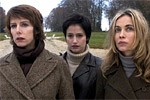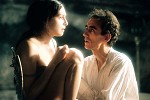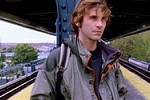 SHADOWS ARTHOUSE FILMS ’05
SHADOWS ARTHOUSE FILMS ’05THE PIANO TUNER OF EARTHQUAKES | UNKNOWN WHITE MALE
< < M O R E | M O R E > >
last update 23.Oct.05
See also: SHADOWS FILM FESTIVAL | SHORT FILMS
 R E V I E W B Y R I C H C L I N E
R E V I E W B Y R I C H C L I N E L’Enfant
L’Enfant
 The Dardenne brothers are back with a third Cannes-winning feature (see also Rosetta and The Son) that doggedly follows one character through a series of seemingly mundane yet life-changing events. It drags badly in the second half, but it's worth sticking with for the overwhelmingly moving conclusion.
The Dardenne brothers are back with a third Cannes-winning feature (see also Rosetta and The Son) that doggedly follows one character through a series of seemingly mundane yet life-changing events. It drags badly in the second half, but it's worth sticking with for the overwhelmingly moving conclusion.
Sonia (Segard) is a young woman who has just had a baby with her immature boyfriend Bruno (Renier). She hopes this'll calm him down and bring out some responsibility, instead of the life of petty crime and unfocussed ambition that characterises their poor community. While the baby does deepen their relationship, it also sparks a reprehensible idea in Bruno's mind, and he makes a terrible, unforgivable decision that could undo this little family forever. How far will he go to redeem himself?
Babies having babies is the theme here--the underclass living off the state in a grim setting where they struggle for every meal. But the Dardennes maintain a firm sense of balance amid their typically meandering style: Sonia and Bruno have a lively, sweet, childishly energetic relationship, and Bruno does have a choice about how he lives. His most telling comment is that that only losers get jobs; he'd prefer to make a living through crime. Of course this is Bruno's tragic flaw, and he's going to pay. And probably take everyone down with him.
Once he digs his hole, it's very difficult to have any sympathy for him. And this is where the film becomes almost unbearable, as we watch him flail around for even a shred of self-respect, dignity or forgiveness. It's extremely well-done, cinematically, in that we really lose all hope for any sort of redemption (as opposed to Hollywood movies in which we know it will all be just fine in the end). The Dardennes and their raw, honest cast really make us believe it! But there's at least a half-hour in which we really don't care what he does, which is a problem. Then something remarkable happens, and the filmmakers draw the story to an astonishing conclusion that really does take our breath away.
with Jérémie Renier, Déborah François, Jérémie Segard, Olivier Gourmet, Fabrizio Rongione, Stéphane Bissot, Mireille Bailly, Anne Gérard, Bernard Marbaix, Frédéric Bodson, Léon Michaux, Samuel de Ryck

release Bel 14.Sep.05,
UK 10.Mar.06,
US 24.Mar.06
05/Belgium 1h40
CANNES FILM FEST
20.Oct.05 lff
 R E V I E W B Y R I C H C L I N E
R E V I E W B Y R I C H C L I N E L’Enfer
L’Enfer
 MUST-SEE
MUST-SEE
 Developed by the late Krzysztof Kieslowski and his writing partner Piesiewicz, this is the second in the Heaven, Hell and Purgatory trilogy (Heaven was directed by Tom Tykwer in 2002). And it marks a striking departure for Bosnian director Tanovic (No Man's Land)--a lushly made and strongly provocative Euro-drama with first-rate actors.
Developed by the late Krzysztof Kieslowski and his writing partner Piesiewicz, this is the second in the Heaven, Hell and Purgatory trilogy (Heaven was directed by Tom Tykwer in 2002). And it marks a striking departure for Bosnian director Tanovic (No Man's Land)--a lushly made and strongly provocative Euro-drama with first-rate actors.
Three sisters live separate lives in Paris. Sophie (Beart) is married to Pierre (Gamblin), who she suspects is having an affair. Celine (Viard) is being stalked by a handsome stranger (Canet) who clearly wants to tell her something. And Anne (Gillain) is unable to cope with the fact that her married lover (Perrin) wants to break up. As they all struggle, a secret is about to emerge from their past that might help explain why their lives are such a mess.
Tanovic sets the tone from the start, with an eerie childhood flashback and a kaleidoscopic title sequence that feels like it belongs on a Hitchcock film. Throughout the story, his direction is fiendishly observant but understated and insinuating, smoothly and elegantly catching the events and letting the cast shine in each scene. And what a cast! Each actor fills his or her scenes with nuance and barely concealed emotion. Viard is the stand-out, if there must be one, as a woman who's spent so long caring for her cranky, disabled mother (the intensely brilliant Bouquet) that she can't quite cope with the real world.
Many sequences feature little or no dialog, and yet the performances are full or life and meaning: Beart prowling around a vertiginous hotel in search of her husband and his lover, Viard unsure what to do when Canet shows up at her flat, Gillain ritualistically burning her lover's memory. The film is a masterwork of repeated images and parallel events, and as the characters are forced to confront the truth about their past, it remarkably captures something both hopeful and tragic. It's all about the dangers of not listening to or trusting in the ones we love. Or trusting the wrong loved ones altogether. Stunning.
scr Krzysztof Piesiewicz
with Emmanuelle Béart, Karin Viard, Marie Gillain, Guillaume Canet, Jacques Gamblin, Jacques Perrin, Carole Bouquet, Jean Rochefort, Miki Manojlovic, Maryam d'Abo, Gaëlle Bona, Georges Siatidis
 release Fr 30.Nov.05,
release Fr 30.Nov.05,UK 21.Apr.06
05/France Asap Films 1h39
TORONTO FILM FEST
LONDON FILM FEST
21.Oct.05 lff
 R E V I E W B Y R I C H C L I N E
R E V I E W B Y R I C H C L I N E
 For their second feature, the Quay Brothers use real actors and full-scale sets to recreate their grainy puppet aesthetic. It's a surreal experience, maddeningly incomprehensible and dull, but with an evocative beauty.
For their second feature, the Quay Brothers use real actors and full-scale sets to recreate their grainy puppet aesthetic. It's a surreal experience, maddeningly incomprehensible and dull, but with an evocative beauty.
Malvina (Cesar) is a young opera singer set to marry her beloved Adolfo (Saracho), but at the wedding the sinister Dr Droz (John) kills and then kidnaps her. In his isolated mountain lair, he revives her and plans to stage a cataclysmic opera with her and his seven mechanical tableaux, which the piano tuner Felisberto (Saracho again) is getting into shape. But Felisberto falls for Malvina, and with the help of Droz's housekeeper (Serna), develops a plan to rescue her.
The film looks amazing--dark and shadowy, playing with light and mirrors, investing a lush, old world elegance to the grey and grim settings. It looks and feels like a cross between a Guy Madden movie and one of those creepy-sad puppet shows in Being John Malkovich. Except that the Quay Brothers neglect to include any wit or humour. As a result, it feels self-indulgent and almost painfully dreary, like an exercise in pure artistry and tone, without any consideration for the audience's need to connect with the story or characters.
Performances are almost irrelevant, as actors are used merely as figures by the directors. They do add a level of pathos; Saracho manages to inject some curiosity and optimism to counter everyone else's melancholy. But it's all so heavily stylised that there's no one we can really identify with, and no energy at all. Much of the sparse dialog consists of pretentious cliches and ponderous poetry that can't mean much to anyone beyond the Quays.
The plot is structured in a series of blackout scenes without any sensible transitions between them. As a feature film, it's clunky, draggy and uneven, and it only keeps us awake due to the otherworldly beauty of the virtually colourless design. And as the story mixes Svengali, Faust and the Phantom of the Opera into an eerily subdued tale, there's also something primeval that grabs our interest, even if we never feel an emotional punch.
scr Alan Passes, Quay Brothers
with Amira Casar, César Saracho, Gottfried John, Assumpta Serna, Henning Peker, Gilles Gavois, Volker Zack, Ljubisa Lupo-Grujcic, Thomas Schneider
 release UK 17.Feb.06,
release UK 17.Feb.06,US 17.Nov.06
05/Germany 1h39
21.Oct.05
 R E V I E W B Y R I C H C L I N E
R E V I E W B Y R I C H C L I N E
 By focussing on one story, this documentary about memory and identity is both gripping and provocative. It's inventively shot and edited, and the central story is fascinating. But it feels more like a TV doc than a feature film.
By focussing on one story, this documentary about memory and identity is both gripping and provocative. It's inventively shot and edited, and the central story is fascinating. But it feels more like a TV doc than a feature film.
Doug Bruce was an active, life-loving guy who one day in his mid-30s woke up on a New York Subway train without a clue who he was. One tentative object in his bag led to someone who could identify him, and soon he was piecing his life back together. But is Doug the same guy he was before? His family and friends are strangers now. His personality is more introspective and less daring. His goals in life have shifted drastically.
Filmmaker Murray had been Doug's friend for 15 years, so his careful reconstruction Doug's first two years as a new person have a hugely personal slant. This makes the film much more probing and intense; we really get into Doug's mind as he talks about who he thinks he is, and how the evidence (photos, videos, souvenirs) points to who he was. The doctors say it's uncommon to have such a drastic blanking of experiential memories, and they can't explain why it happened to Doug. But it's a virtual certainty that someday he will remember his past--creating a third Doug, combining old and new.
The film works on both personal and scientific levels. Intimate footage of Doug talking to camera and interacting with family and friends is interspersed with a thorough examination of human memory, how this develops into who we are, and how essential knowledge and personal skills can survive an event like this one. Many things strike deeply resonant chords, such as the idea of reinventing ourselves and sorting through relationships with fresh eyes. As Doug rediscovers politics, people, food, places, transport, history and more, Murray assembles the film with artistry and style. But it also feels a bit soft and safe, perhaps because it's such a personal project. And as a result, it feels like something we should be seeing on TV, not necessarily in a cinema.
with Doug Bruce, Rupert Murray, Ivan Bruce, Daniel Schacter, Mary Warnock, Lily Frost, Stephen Frailey, Isabelle Germano, Marina, Christina, Eva, Nadine, Magda, Narelle, Pete, Charlie
 release US 24.Feb.06
release US 24.Feb.06UK 7.Apr.06
05/UK FilmFour 1h28
SUNDANCE FILM FEST
LONDON FILM FEST
21.Oct.05 lff


See also: SHADOWS FILM FESTIVAL | SHORT FILMS
© 2005 by Rich Cline, Shadows
on the Wall
